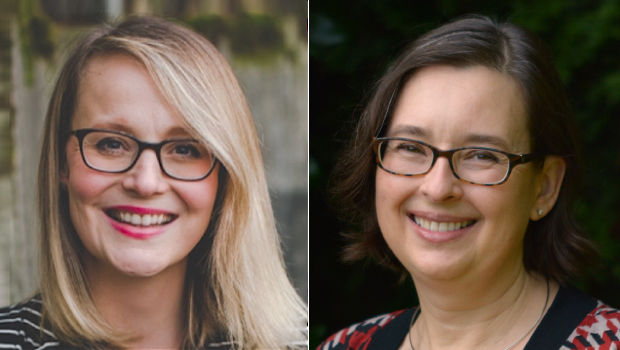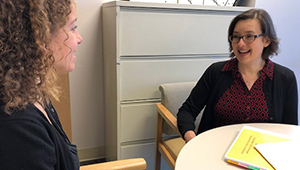Meeting participants' needs: Our research interventionists

Jessie Waiamau-Ariota, an interventionist with KPWHRI (left), and Deborah King, KPWHRI's interventionist manager
Deborah King and Jessie Waiamau-Ariota describe their pivotal role in research on youth mental health — and more
Have you volunteered for a Kaiser Permanente Washington Health Research Institute (KPWHRI) study? If so, you may have interacted with an interventionist. These researchers have direct contact with study participants, including providing treatments the study is testing. KPWHRI Interventionist Manager Deborah King, MSW, LICSW, and Research Interventionist Jessie Waiamau-Ariota, MA, LMHC, are among dozens of KPWHRI interventionists. They answered a few questions about their contributions to health research.
What do interventionists usually do?
King: Interventionists are the people who are in direct contact with study participants to deliver an intervention. That might be providing assistance to navigate the health system or offering therapy, as in a recent study on youth mental health. For other studies, interventionists provide health or behavioral-change coaching, or even give vaccinations. Interventionists are often on study teams from the start because they provide expertise and advise on the design of study intervention materials.
Waiamau-Ariota: Studies especially need us to help develop interventions, because we're sensitive to what patient participants need and want. We help design any clinical tools for participants — for example, for assessing substance or alcohol use disorders. We help with scripts for interacting with participants and the cadence of interactions.
You were part of a youth mental health study called SUAY, for "Targeted Approach to Safer Use of Antipsychotics in Youth." What did you do for SUAY?
Waiamau-Ariota: Interventionists had two roles in SUAY. The navigators did outreach to learn what the participants and their families needed and then helped them meet those needs. That was key. Health care systems are hard to navigate, so the participants appreciated that help.
Part of the outreach was to see if youth participants were getting therapy and, if not, to connect them with a therapist. I was one of the mental health professionals providing telemental health therapy as a bridge to participants and families until they got a long-term therapist.
King: I don't work directly with participants now that I'm supervising interventionists. My job is making sure studies get the health professionals they need to accurately, consistently provide the interventions being tested. For SUAY, Erin Gonzales, PhD, a psychologist at Seattle Children's, and KPWHRI Research Interventionists Rebecca Phillips, MA, Ashley Glass, MSW, and Jessie worked directly with the youth and their families.
What is the goal of SUAY?
King: SUAY works toward safer use of antipsychotic medications for youth. We just finished collecting the data, and the analysis is in progress.
Participants included about 800 children and adolescents between ages 3 and 17 at Kaiser Permanente in Washington, the Northwest region, and Colorado, and at Nationwide Children’s Hospital in Ohio. All had nonpsychotic disorders and prescriptions for second-generation antipsychotic medications, even though that's not the recommended first-line treatment for them. SUAY guided participants and their prescribers toward guideline- and evidence-based treatments. The families were also involved in the study.
SUAY had 3 components: Prescribing physicians received consultation about use of antipsychotic medications for this group. Patients worked with a navigator to coordinate their care. Finally, if they didn't have a regular therapist, they were offered telemental health from a mental health professional. The overall goal is safer prescribing of antipsychotic medications for youth. The results will help find ways to achieve that.
Telemental health was part of SUAY even before the COVID-19 pandemic. Why was that part of the interventionists’ work?
King: Part of the reason for telemedicine was access — and not just to help families with geographic challenges to getting to a therapist for in-person visits. Telemental health also gave youth and families an opportunity to try out therapy, to build trust in that kind of care, and show that it can help.
Waiamau-Ariota: Telemental health worked for SUAY since our therapy was a bridge to long-term care, a way to problem-solve with youth and families until they connected with a regular therapist.
What else are interventionists doing at KPWHRI?
King: Some current examples are that interventionists are providing cognitive behavioral therapy for pain in Dr. Lynn DeBar's RESOLVE study, assisting with suicide prevention and related care in Dr. Greg Simon's studies, and interacting with patients in vaccine trials.
Jessie, what do you like about being an interventionist?
Waiamau-Ariota: In addition to being a research interventionist, I have a therapy practice outside Kaiser Permanente. I find a lot of value in participating in both the clinical and research worlds — and the interventionist role offers so many wonderful connections and learning opportunities as far as evidence-based practice goes. I've learned so much about different therapeutic modalities, sleep habits, behavior change, etc., all by being part of research teams over the years.
Thank you for talking with us! People who have skills and training in working directly with patients and are interested in research can watch for opportunities at the KPWHRI careers page. We're grateful for Kaiser Permanente members who volunteer for research and the interventionists who interact with them
mentorship at kpwhri

Annual mentorship award honors Deborah King and Dr. Diana Buist
Every year the KPWHRI award recognizes two individuals who provide outstanding service in promoting the career development of others.
caregiving

Training for caregivers of people with dementia: How to scale up
Dr. Rob Penfold leads pragmatic trial of new online version of proven program developed by UW colleagues.


